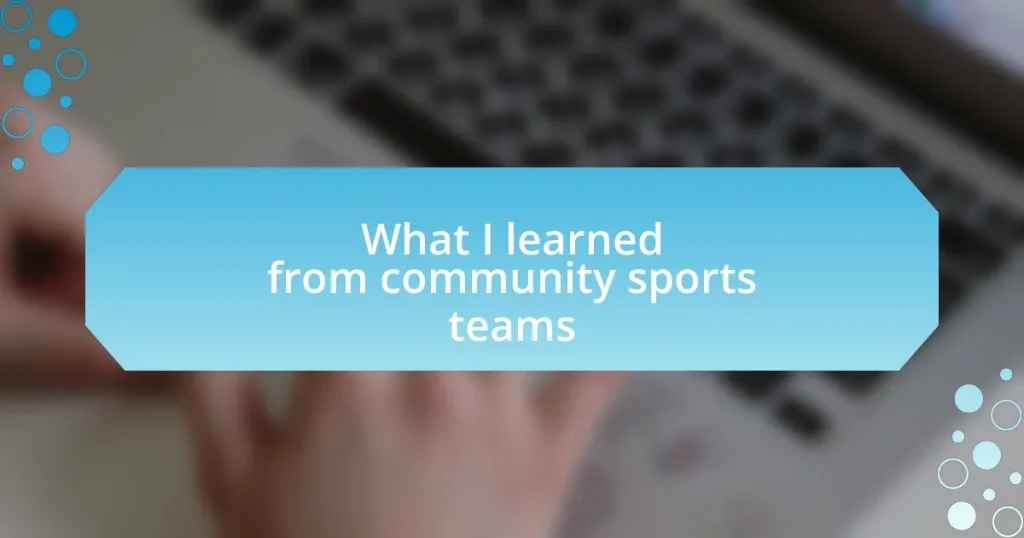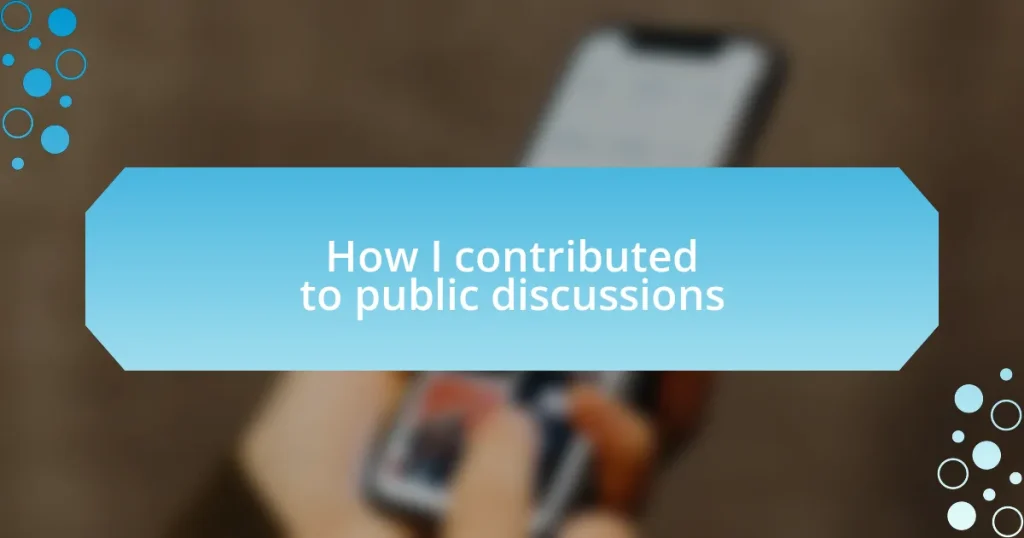Key takeaways:
- Participation in community sports teams fosters a sense of belonging, promotes personal growth, and enhances physical and mental health.
- Teamwork teaches essential life skills such as communication, accountability, and perseverance.
- Leadership opportunities in sports encourage connection, conflict resolution, and strategic development among teammates.
- Effective team collaboration is enhanced through clear goal-setting, active listening, and regular feedback sessions.

Benefits of Community Sports Teams
Participating in community sports teams fosters a sense of belonging that can be incredibly empowering. I remember joining my local soccer team after moving to a new city; the immediate camaraderie and support from teammates transformed that lonely feeling into something vibrant. Have you ever found yourself in a place where you feel isolated? That sense of connection through a shared goal—whether it’s winning a match or just enjoying the game—can be a lifeline, promoting not only teamwork but also friendship.
Moreover, community sports teams offer a platform for personal growth and skill development. I learned more than just how to dribble a ball; the experience taught me about discipline, resilience, and the value of practice. Each training session and every match felt like a step forward, pushing me to overcome my fears and improve. Have you considered how much your abilities could grow in an encouraging environment? That supportive atmosphere can be the difference between giving up and finding your passion.
Another remarkable benefit is the positive impact on physical and mental health. When I first joined the team, I noticed that my energy levels soared, and my mood lifted significantly after each game. The physical activity kept me fit, while the laughter and shared joy acted as a release for stress. Isn’t it fascinating how something as simple as playing a game can weave together fitness and happiness? Community sports teams not only strengthen our bodies; they nourish our minds and create a vibrant, healthy community spirit.

Life Skills from Team Participation
Participating in community sports teams teaches invaluable life skills that extend far beyond the playing field. I vividly recall the times I had to learn to communicate effectively during intense games; those moments forced me to articulate my thoughts quickly and clearly to coordinate plays with my teammates. Isn’t it surprising how a simple shout or gesture can create synergy among diverse personalities, making us work toward the same objective?
Additionally, being part of a team has amplified my understanding of accountability. There were times when I was responsible for specific roles during practice and games, and I realized how my actions impacted the whole team. It struck me that every time I showed up prepared or encouraged a fellow teammate, I contributed positively to our collective performance. Have you experienced that sense of responsibility before? It truly fosters a deeper connection not only with the sport but with the teammates who rely on one another.
I also recognized that perseverance is a key lesson learned from team participation. I still remember a particularly tough match where we were losing, but instead of giving up, we rallied together to brainstorm strategies. The thrill of turning the tide and the pride that came from never giving in remains etched in my memory. How empowering it is to realize that, together, we can turn setbacks into comebacks!
| Life Skill | Team Participation Impact |
|---|---|
| Communication | Facilitates effective interaction to strategize and execute plays. |
| Accountability | Cultivates a sense of responsibility for team outcomes. |
| Perseverance | Encourages resilience in the face of challenges, fostering a never-give-up attitude. |

Leadership Opportunities in Sports
Taking on leadership roles in community sports teams has been a transformative experience for me. I remember stepping up as a captain during a regional tournament; the weight of responsibility was palpable. I felt a mix of excitement and anxiety as I realized I needed to motivate my team while also strategizing effectively. The challenge pushed me to develop my leadership skills, teaching me the delicate balance between guiding and listening to my teammates—a crucial lesson I carry with me to this day.
Leadership in sports can manifest in various ways, and it can resonate deeply with team dynamics. Here are some specific opportunities where I’ve noticed this growth:
- Team Captaincy: Leading by example fosters respect and trust among teammates.
- Mentorship: Supporting younger or less experienced players enhances one’s ability to empathize and teach.
- Conflict Resolution: Navigating disagreements helps to cultivate a cooperative environment.
- Motivation Techniques: Learning to inspire and motivate individuals based on their unique strengths improves team morale.
- Strategy Development: Involving the team in strategic planning encourages shared ownership and accountability for outcomes.
Each of these areas has reinforced my belief that leadership is not just about authority but about creating connections and building a cohesive unit. It’s a rewarding journey filled with lessons in understanding others and working alongside them toward common goals.

Building Social Connections through Sports
Building social connections through sports has been a pivotal part of my journey. I recall my first day playing on a community soccer team; I was nervous but excited. With a simple pass of the ball, a shy smile from a teammate turned into a lasting friendship. Isn’t it interesting how a shared activity can break down barriers and foster connections that might otherwise never occur?
Participating in team sports offers more than just physical activity; it cultivates a sense of belonging. I’ve met individuals from various walks of life who, despite our different backgrounds, bonded over post-game celebrations and shared goals. Those connections often extend outside the field, leading to coffee breaks, movie nights, and support during tough times. This community feeling is something I cherish, and it highlights how sports can create a familial atmosphere.
There’s something profoundly fulfilling about cheering each other on during matches. The adrenaline rush from a close game can bond people in a way that’s hard to replicate elsewhere. I remember the thrill of our championship match—victory was sweet, but the camaraderie and collective joy were what made that moment truly special. How often do we find such pure connections in our daily lives? It’s this magic of sports that continues to remind me of the importance of relationships formed through shared experiences.

Improving Physical Health through Sports
Improving physical health through sports has been a transformative aspect of my life. I remember when I first joined a local basketball league; the initial struggle of trying to keep up with my teammates quickly led to noticeable improvements in my fitness. Each practice and game pushed my endurance a little further, making me feel stronger both physically and mentally. Have you ever noticed how working towards a common goal in sports can elevate your personal health?
Participating in sports has a way of making you more aware of your body and its capabilities. After a few months, I was not only running faster but also became more mindful of my nutrition to enhance my performance. The little choices—like swapping out snacks for fruits—became easier when I was motivated by my team’s progress. Isn’t it empowering to realize how much control we can have over our health through our lifestyle choices?
One of the best parts about sports is that it’s not only about intense workouts; it’s also about fun and enjoyment. I vividly recall our weekend soccer matches, where the laughter and friendly competition left me exhausted but exhilarated. The act of playing itself became a joyful release, making it less like a chore and more like a celebration of physical health. How often do we get to combine exercise with genuine happiness? That’s where the true magic lies.

Overcoming Challenges in Team Dynamics
In team dynamics, I’ve often encountered moments where communication broke down, creating tension. I’ll never forget a time during a volleyball tournament when misunderstandings about positions led to confusion during crucial plays. We lost that match, but the experience taught me the importance of open dialogue and clarifying roles to ensure everyone’s on the same page. Have you ever felt the frustration of a lack of communication in a team setting?
Navigating different personalities can be an uphill battle. One of my teammates was incredibly driven, but that intensity clashed with the laid-back attitude of another player. Instead of allowing these differences to split us, we invested time in understanding each other’s perspectives. Facing conflicts head-on ultimately strengthened our bond, transforming obstacles into opportunities for growth. Isn’t it fascinating how diversity in a team can lead to both challenges and enriching experiences?
Moreover, I learned that perseverance is key when dealing with setbacks. After losing a significant game, our spirits were low, and the temptation to give up was strong. However, we rallied together, using that defeat as motivation to sharpen our skills. Watching my teammates lift one another up during practices was a powerful reminder that overcoming challenges is easier when everyone is committed to the same goal. Can you recall a time when a setback turned into a stepping stone for your team?

Strategies for Effective Team Collaboration
In my experience, setting clear goals can drastically improve team collaboration. During a local soccer league, we struggled at first because we didn’t have a shared vision of what we wanted to achieve. Once we gathered for a team meeting and openly discussed our ambitions and expectations, our teamwork flourished. Have you ever experienced the magic that comes from being aligned in purpose?
I also found that actively listening to teammates enhances collaboration. There was a moment in a basketball practice where one teammate offered a different play strategy that none of us had considered. Instead of dismissing the idea, we took a moment to listen and explore it together. That willingness to hear each other out not only generated new plays but also fostered a sense of trust and respect among us. When was the last time you took a step back to truly listen to an idea that changed your perspective?
Lastly, implementing regular feedback sessions can transform a team’s dynamic. After every game, we dedicated time to reflect on both our successes and what we could improve. This practice nurtured a culture of honesty and accountability, which I found incredibly empowering. It made me realize that growth happens when we embrace vulnerability and strive for continuous improvement. Do you believe that feedback is essential for a team’s success?














